Rise in A*-C GCSE grades in Northern Ireland
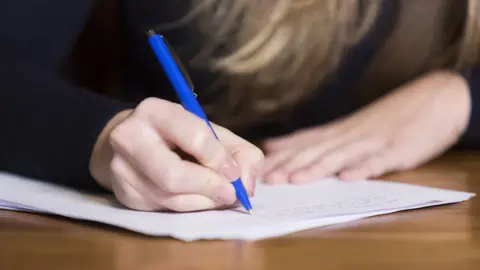 BBC
BBCThere has been a rise in the number of GCSE entries awarded A*-C grades in Northern Ireland.
The proportion of entries marked as A*-C has risen by 1.1% to 82.2% in 2019.
However, the number of top A* grades has fallen from 9.9% of entries last year to 7.7% in 2019. A new C* grade has also been introduced in Northern Ireland.
Thousands of pupils across Northern Ireland received their GCSE results on Thursday.
Twin sisters, Lucy and Katie Knox, both 16, are pupils at New-Bridge Integrated College in Loughbrickland, County Down.
It was an A, A*, three Bs and 3Cs for Lucy, who would like to be a graphic designer.
"I am so happy," she said. "I have got all the results that I need, and they are high as well.
"I didn't sleep last night at all, so it has been quite nerve-wracking."
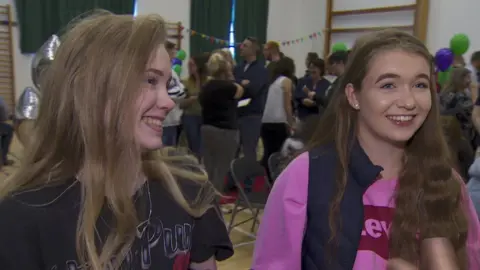
Her sister, Katie, gained eight GCSEs from A* to C grade and is going to college to study health and social care.
Being twins made them a "wee bit more nervous", she said.
"If one of us had failed and the other one passed, it would have been scary," she added.
Jack Moore, from the same school, said he had received mostly As and Bs and was "absolutely ecstatic".
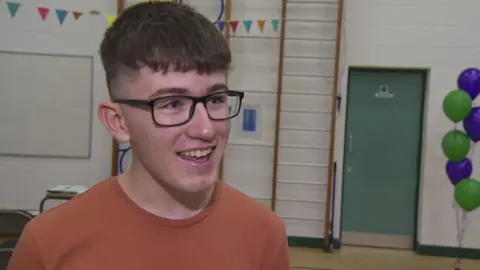
Jack, who would like to become a primary school teacher, said: "These past two months have been such hard work - blood, sweat and tears, everything, and I am so happy it has all paid off in the end".
Elsewhere, Grace Dickson, from Lisneal College in Londonderry, said she had gained 10 GCSEs and was "very pleased".
"I am going to do A-levels now, double health and social and business," she said. "It is a big relief."
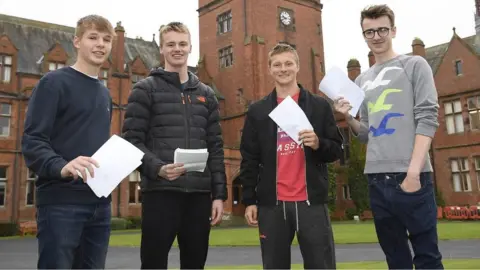 Michael Cooper
Michael CooperDisadvantaged backgrounds
About 5,500 GCSE entries in Northern Ireland this year were made through English exam boards which means that some pupils received results in the form of numbers as well as letters.
That is because GCSEs in England are now graded numerically from 9 to 1.
The fall in the proportion of A* grades is mainly due to alignment with the top 9 grade in England.
Northern Ireland's exams board CCEA has, however, maintained the A*-G grading system - although introducing the new C* grade.
The vast majority of GCSEs (96.6%) are studied through CCEA.
The performance gap between girls and boys closed slightly in 2019.
The percentage of GCSE entries from boys awarded A*-C is 78.5%, up 1.6% on 2018.
The number of A*-C grades awarded to entries from girls rose by 0.5% to 85.6%.
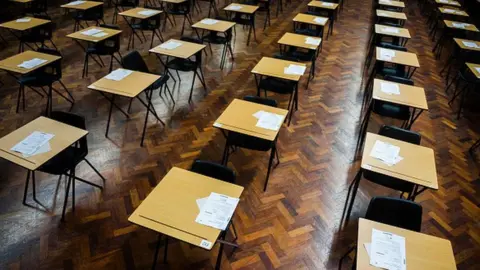 Getty Images
Getty ImagesThere were also increases in the number of A*-C grades awarded to entries in both Maths and English Language.
While GCSE results and some statistics are released today, full details of how pupils performed this year will not be available for a few months.
In 2018, 71.8% of pupils in Northern Ireland achieved at least five GCSEs at grades A*-C including English and Maths.
However, fewer pupils from disadvantaged backgrounds got those qualifications.
Slightly more than half (51.8%) of pupils entitled to free school meals (FSME) got at least five GCSEs at grades A*-C including English and Maths in 2018.
Northern Ireland's most recent programme for government aimed to reduce educational inequality by increasing the number of disadvantaged young people attaining those GCSE grades.
